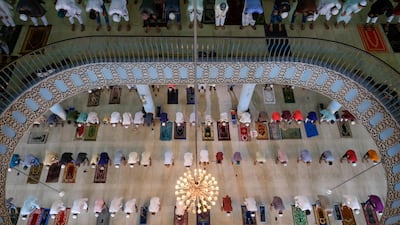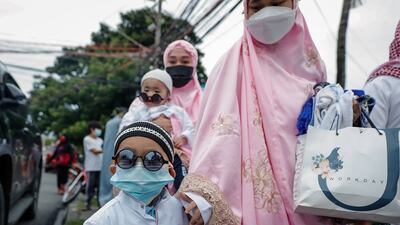Follow the latest updates on Hajj 2021 here
Muslims around the world celebrated Eid Al Adha on Tuesday, marking the beginning of the final rituals of the Hajj in Saudi Arabia.
Pilgrims returned to the Grand Mosque in Makkah from Muzdalifah plains early in the morning to start the Jamarat stoning of the devil ceremony.
In previous years, pilgrims have gathered small rocks at Muzdalifah, but because of Covid-19 this year the faithful were given a small sack of pebbles that had already been collected, to ensure they could maintain social distancing.
The stoning ceremony is a symbolic re-enactment of Prophet Ibrahim's hajj, where he stoned three pillars representing the temptation to disobey God. It marks the beginning of one of the most sacred Muslim holidays.
Some stood and prayed at the site, gathering on yellow markers laid down as a guide for social distancing.
The stoning came as Muslims around the world celebrate Eid Al Adha, a holiday marked by prayers and the sacrifice of a sheep, goat or cow - by those who can afford to - to give meat to family members and the poor.
Muslims believe the Prophet Ibrahim was commanded by God to sacrifice his son, Ismail, but God spared him and sent a ram in his place.
In an address on Tuesday morning, Saudi Arabia's King Salman wished Muslims around the world a blessed Eid Al Adha.
He spoke of the success of Saudi Arabia's fight against the pandemic and the work done to ensure a safe Hajj for all pilgrims.
“Praise be to God — in raising the operational capacity of the Two Holy Mosques and enabling those who visit them to perform rituals in a healthy and safe environment.”
King Salman went on to thank all those who were stationed in Makkah for helping to ensure a smooth Hajj.
“I ask God to accept their pilgrimages, and from all Muslims, their good deeds, and that the Almighty will return this feast to the Islamic nation as it enjoys security, stability, safety and prosperity.”
Like so many around the world, the pilgrims also marked Eid.
“The first thing I did was FaceTime my grandchildren and children and now it feels like Eid,” Fatima, a Moroccan pilgrim, told The National in Makkah.
“I had to see their faces … They are so excited and happy for me, and even though they miss me, this is the best place for me to be. May God accept our Hajj.”
Stoning of the devil rituals
The mask-clad faithful at Hajj, who spent Monday night at camps in the Valley of Mina, converged on Mount Arafat on Monday where it is believed the Prophet Mohammed delivered his final sermon, for the most important of the Hajj rituals.
The Hajj, one of the five pillars of Islam and a must for able-bodied Muslims with the means to travel at least once in their lifetime, is usually one of the world's largest religious gatherings, but it has been held in a downsized form under coronavirus limits for the second year running.
Just 60,000 people, all citizens or residents of Saudi Arabia, were selected to take part in this year's Hajj, with foreign pilgrims again barred.
Participants were chosen this year from more than 558,000 applicants through an online vetting system, with the event confined to fully vaccinated adults aged 18-65 with no chronic illnesses.
After the first stoning, pilgrims offer their own sacrifices, but this year for safety reasons that is being done through an online token system.
“I paid 799 Saudi riyals ($213) online for my sacrifice,” one pilgrim said.
Female pilgrims cut a lock of their hair and men opt to either cut or shave their heads.
Pilgrims will throw pebbles in the symbolic stoning of the devil rituals over the next three days, before heading to the Grand Mosque to perform the farewell Tawaf to complete their Hajj.
Misting devices installed by the authorities helped ease the hot conditions as the pilgrims performed the rites in the glare of the Gulf summer.
The kingdom has recorded more than 509,000 coronavirus infections to date, and more than 8,000 deaths. Some 20 million vaccine doses have been administered in the country of more than 34 million people.


















































































































